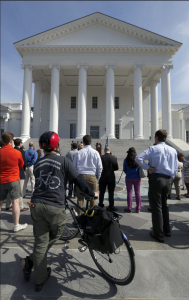
Photo courtesy of Richmond Times-Dispatch
As we prepare for next year’s legislative session in Richmond, it seemed like a good time to revisit a post from nine years ago. Although we are hopeful that the next session will be more bicycle-friendly that recent ones, we believe that better bicycling really ought to be a non-partisan subject. Smart transportation policies that include bicycling are something that Republicans and Democrats of all stripes can get behind.
Back in 2010 FABB shared the views of Tom Bowden, who was then the chair of the BikeWalk Virginia Advocacy Committee. A self-described “conservative lawyer,” Tom later served as a board member and vice president of the Virginia Bicycling Federation.Tom’s advice on bridging partisan divides on bicycling from a conservative perspective is worthy of a review.
Tom asserted that bicycling is conservative by nature (“It conserves energy, it’s individualistic, and it’s anything but new-fangled”) and that conservative elected officials can be receptive to arguments for more bike infrastructure. He advised that advocates should not let campaign posturing turn them away because all representatives have cyclists in their districts and would probably like to claim that they brought dollars to their district.
He continued with the following talking points to use:
- Cycling is an exercise (literally) of a fundamental freedom – freedom of movement.
- Cycling is efficient. True Conservatives love efficiency!
- Cycling has a glorious history of entrepreneurism! Think: Wright Brothers, Schwinn, and Trek. America invented the mountain bike, BMX, and freestyle.
- Focus on the positive. Avoid over-the-top pro-bike or anti-car rhetoric.
- Cite American rather than European examples of successful bicycling policies (this is easier to do in 2019 than it was in 2010).
He also suggested that advocates should use numbers and that the following topics can be persuasive:
- Comparative values of similar home properties with and without nearby bike paths.
- Bicycling industry jobs and tax revenue generation.
- Cycling generated economic activity
- Health outcomes and the impact on health care costs from increased activity and reduced pollution
Good advice, but getting some of the data needed to support pro-bicycling polices can be a challenge. FABB continues to work with local officials and national advocacy organizations to make such information available.
Want to help support FABB in these efforts? Please consider donating now or volunteering to help us with advocacy programs in 2020 by contacting us at [email protected].
